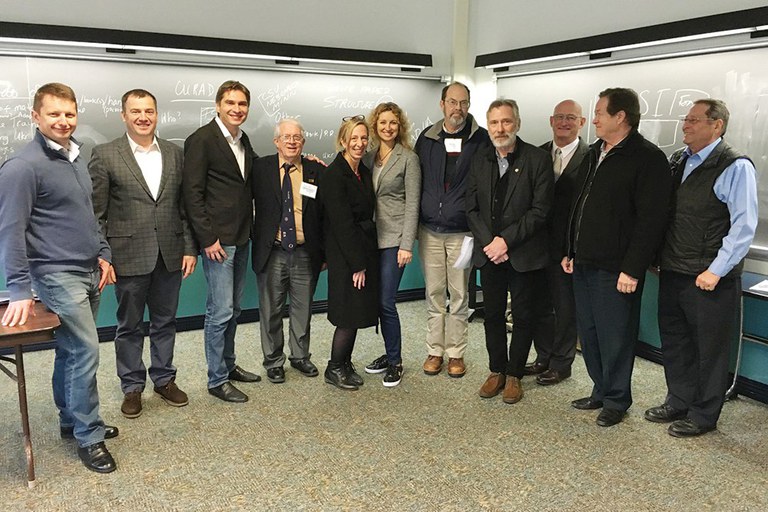Posted: March 30, 2023
The college has strengthened its 30-year relationships with universities in Ukraine.

Penn State assembled an elite group of experts from Ohio State University, Kansas State University, University of Missouri, University of Maryland and Louisiana State University, to form the Consortium for Ukraine's Rural and Agricultural Development, or CURAD. Shown, from left, are Oleksandr Labenko and Oleksandr Kovalchuk, 2018 Woskob International Research in Agriculture (WIRA) Scholars; Vlad Konovalchuk, Bridges Agricultural Extension Center, Kyiv; Willi Meyers, University of Missouri; Deanna Behring, Penn State; Lina Dotsenko, Bridges; Jim Dunn, Penn State; Yurij Bihun, consultant; Rick Roush, Penn State; George Woskob, philanthropist and local businessman; and Allan Lines, Ohio State. Not pictured: Mykel Taylor, Kansas State, and Jonathan Hubche, Louisiana State. Photo: Penn State
In February 2022, Penn State's College of Agricultural Sciences was preparing to celebrate the 30th anniversary of its partnership with Ukraine. Then came the Russian invasion.
"We were going to have a celebration, a renewal of partnerships, a recognition of all the great things that were happening," said Deanna Behring, assistant dean and director of Ag Sciences Global. "It was an exciting time. When the war broke out, we said, 'What do we do now?' The answer is we are going to stand by our friends and colleagues in Ukraine, renewing and strengthening those partnerships."
For 30 years, the college has had a strong and productive working relationship with agriculture and universities in Ukraine -- a relationship that began in 1992 when real estate developers Helen and Alex Woskob, of State College, established the Center of Ukrainian Agriculture at Penn State. The center fostered collaboration between Penn State and the Ukrainian Agricultural Academy, now the National University of Life and Environmental Sciences, in Kyiv.
The Woskobs' philanthropic gift through the Woskob New Century Fund -- plus an additional $1 million in federal grants -- has brought about the exchange of faculty and students, seminars and academic meetings, cultural exchange activities and collaborative education, research and extension activities, all to support the democratic evolution of Ukraine.
"Agriculture and rural development are important research areas and are foundational to economic growth and healthy, open and democratic societies," Behring said. "That's the philosophy behind our partnership."
Ukraine, with its fertile soil and abundant grain fields, is critical to meeting the world's food demands. But over the years, Ukrainian farmers have faced challenges, including a moratorium on agricultural land sale, limited access to finance and markets, limited training in sustainable farming practices, lack of equipment, and problems with agricultural infrastructure.
Since the Russian invasion, Rick Roush, dean of the College of Agricultural Sciences, in partnership with Roger Brindley, vice provost for Penn State Global, has been leading a university-wide task force to organize the Penn State response to support academic partners and scientists in Ukraine.
Through the task force, Penn State initiated a program in which each college at Penn State has committed to hosting at least one scholar from Ukraine, an honorarium to online speakers to support displaced Ukrainian scholars and a fundraising effort for scholars in need, including those in Ukraine.
The College of Agricultural Sciences, because of its strong leadership role in Ukraine, is leading several initiatives that involve Ukrainian students and scholars. Several faculty members have brought in Ukrainian scientists through Uniting for Ukraine, a state department program. For example, two food scientists are currently at Penn State as part of that program.
"We're doing all we can to bring scientists here during the course of the war to provide them with a safe haven to keep their research and programs going," Roush said. The college also hosts two additional visiting Ukrainian scholars, Lyudmyla Kuzmych and Olga Buchko.
The college also launched a webinar series titled "Impact of the War on Ukrainian Agriculture and Related Sectors." Each speaker is compensated for their time with an honorarium.
The Consortium for Ukraine's Rural and Agricultural Development (CURAD), a recent initiative of the college along with Ohio State University, Louisiana State University and the University of Missouri, was established to aid in land reform in Ukraine. Although efforts are currently on hold because of the war, CURAD's aim is to support small and medium-sized agricultural enterprises, focusing on progress toward sustainable, democratic land stewardship, according to Suzanna Windon, director of the program and an assistant professor in the college.
Penn State also participates in the National Academy of Sciences working group on Ukraine, and Roush recently served as a panelist during a workshop titled "Rebuilding Research, Education, and Innovation in Ukraine."
Behring, Roush and Windon emphasize the comprehensive, long-term nature of the college's partnership with Ukraine. Formal administrative programs bring Ukrainian scholars to Penn State, and various faculty members work on their own to develop relationships with Ukrainian scientists. The college also acts to meet immediate needs, such as organizing donations of medical and other supplies at the request of its agricultural university counterparts in Ukraine.
"As we look to the future and explore what the ag and education sectors will need for rebuilding, we are optimistic about working with our partners in that process," Windon said. "Through all these efforts, the focus remains on strengthening our relationships with our Ukrainian friends and colleagues."
--Krista Weidner
Features
Breaking the Silence on Farm Stress
Farming has always been a demanding profession, but today's farmers face unprecedented pressures that can severely impact their mental health.
Biting Back
Research Targets Vector-Borne Diseases to Save Lives
Leading Forward
Ott brings deep connection to role of dean.


